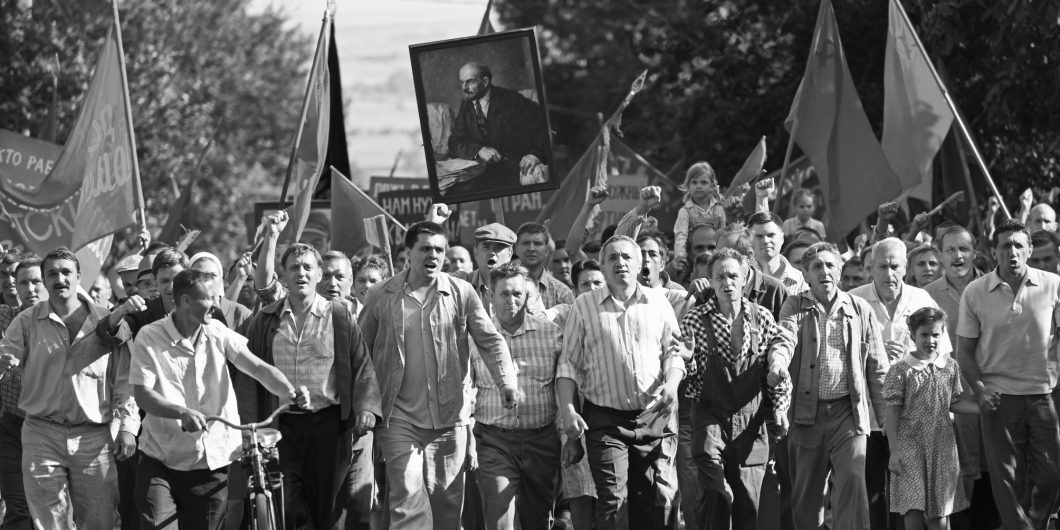A foreign policy that pursues peaceful trade and self-defense aligns well with what classical liberals know about the limits of politics in general.
Ideological Horror
While the genre of the striking new film Dear Comrades! would seem obvious (a political drama), it can also be described as a horror film. Directed by Andrei Konchalovsky, Dear Comrades! depicts the actions leading up to June 2, 1962, when Soviet soldiers opened fire on workers in the city of Novocherkassk. The workers were protesting for better living conditions and lower food prices. Twenty-six people died, and the communist government, reckoning with the poisoned fruits of a system that was rotten to the core, scrambled to cover everything up. It wasn’t until a 1992 investigation that the full scope of the nightmare was revealed. “It was a complete blackout and banned for 30 years,” director Konchalovsky recently said. “Every citizen of Novocherkassk had to sign an affidavit saying they wouldn’t speak about it or risk the death penalty.”
Like a classic monster movie, Dear Comrades! is shot in stark black and white with a narrow aspect ratio chosen by cinematographer Andrey Naydenov. This boxed frame adds to the sense of claustrophobia, the inability to escape, as well as giving the film the look of a documentary. The monsters in this film are not literal but metaphorical vampires, the bloodsuckers who are the representatives of the Soviet system. They are bureaucrats, party members, and elite politicians who are both seen and unseen. Most notable is Khrushchev, who is like a ghastly off-screen specter haunting the story. Every time his name is mentioned, characters freeze with fear.
Yuliya Vysotskaya plays Lyuda, a middle-aged Communist Party functionary in the Novocherkassk district. The first ten minutes of the film expose the corruption, as Lyuda is treated to salami, cigarettes, and candy in a back room at the local shop while the regular people out front fight for scraps on the ever-dwindling shelves. She is also having an affair with a local KGB operative, Loginov (Vladislav Komarov). Her teenage daughter Svetka (Yuliya Burova) works at the Electromotive factory, which is beginning to boil over with protests over shortages. This is where the massacre will originate.
Lyuda is a true believer. “If Stalin were alive, we’d be living under communism already,” she argues. Her theory is that communism became localized in places like Cuba rather than international, and in a world where capitalism is allowed to exist in any corner, the full revolution cannot take place.
The amount of paranoia and repression taking place is incredible. The party members consider the general populace as both childlike and a serious threat. Several years ago Kino video released a series of DVDs collecting old Soviet animated propaganda films. “They treated us like children,” one of those interviewed in the series says. In Dear Comrades!, citizens are talked down to, cajoled, threatened, and given a pat on the head as they are told exactly how they are to go about denying what they have seen. Most nod along, terrified of even suggesting there is any way other than the way of lies. It’s surreal and chilling. It’s also reminiscent of the academic star chambers that censor thought on modern college campuses, of the cancel culture that had become rampant in the tech industry and on social media, and of leftist political groups who have sworn to follow supporters of former President Trump into their private lives and ruin their livelihoods.
Lyuda and Loginov are calling forth the things that made Russia a magnificent country, things that existed long before October 1917.
Local Novocherkassk party bureaucrats and enforcers hold closed-door meetings where the apparatchiks discuss the everyday lives of the people. They examine what was overheard at a sidewalk craps game, what shopkeepers are talking about, and the habits of the citizens. Lyuda’s father (Sergei Erlish) shocks her by wearing an old military uniform that dates back to Czarist days and quietly assures her that his small painting of the Virgin Mary can be burned before it is discovered. The mildest dissenters have to endure “sensitization” training, not unlike the reduction required in the modern West when a celebrity or athlete utters an unacceptable opinion—even if it’s based on fact. When Lyuda’s daughter Svetka announces she supports the protestors because she believes in “constitutional rights” like “the freedom of assembly,” Lyuda suddenly and violently strikes her.
There is no major musical score in Dear Comrades!, which ironically gives the scenes more emotional power—but patriotic songs are occasionally employed as an ironic commentary on the unfolding brutality. When higher-ups in the party come to Novocherkassk, Lyuda argues for the harshest repression of the protestors.
Then, like a Frankenstein whose monster turns uncontrollable, Lyuda is faced with what she has created. Striking workers are fired upon and Svetka goes missing. Lyuda, once the picture of loyalty, now has to navigate Soviet brutality, pettiness, and incompetence as she desperately tries to find her daughter. Vysotskaya is fantastic in this role going from a cold bureaucrat who calls for the heads of dissenters and makes sure her hair and outfits are party suitable to a frantic mother who is missing a child—and losing (although not completely) her faith in what has turned out to be a false religion. Lyuda finds herself listening more and more to her father who tells stories of repression in the past and talks about the brilliant and tragic Soviet novel, Mikhail Sholokhov’s And Quiet Flows the Don. Lyuda goes from coldly reciting party platitudes to frantically trying to negotiate with a would-be helper, pleading for sympathy, asking, “Do you have kids?”
She employs the help of Loginov, her KGB lover who has connections high up in the party. This leads to the most powerful sequence in the film. In a long, uncut shot that goes on for minutes, Lyuda and Loginov quietly sing the “State Anthem of the Soviet Union.” Of course the irony is heavy—their faces worn and grim, their bodies exhausted by the search for a missing daughter, their minds almost broken by communism, the two nonetheless softly chime their allegiance to Russia. But in their delivery there is a difference—the two characters are expressing not just loss, but a real love of the people, history, and culture of Russia. They are calling forth the things that made Russia a magnificent country, things that existed long before October 1917. Still, even after all of that, there are small signs, albeit weak ones, that Lyuda still won’t abandon the faith of dialectical materialism. It holds her like a cult.
Beautifully directed and finely acted, Dear Comrades! is a mesmerizing film that belongs on the too-short list of anti-communist classics like The Lives of Others and Cold War. The film dramatizes the emotional and personal costs that millions paid for their belief in communism. For many, like Whittaker Chambers, that reality hit not when a geopolitical theory or economic system was debunked, but because those with a conscience admitted that they heard the screams.



